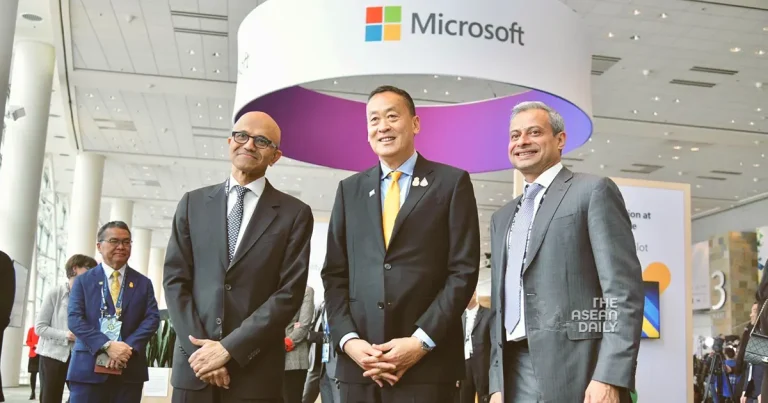18-11-2023 (BANGKOK) Thailand is joining forces with Microsoft to leverage artificial intelligence (AI) and cloud technology, aiming to enhance the country’s economic competitiveness, create high-value jobs, and establish itself as a regional leader in digital innovation and sustainability. Microsoft announced the collaboration after signing a memorandum of understanding (MoU) with the Thai government on November 15 during Prime Minister Srettha Thavisin’s participation in the APEC Leaders’ Meeting 2023 in San Francisco.
Prime Minister Srettha and Microsoft CEO Satya Nadella met during the event and discussed the key objectives outlined in the MoU. Aligned with the Digital Economy and Society (DES) Ministry’s digital government and cloud-first policies, Microsoft will closely collaborate with government agencies to drive the development of intelligent digital infrastructure in various sectors, including agriculture, healthcare, tourism, and education.
The partnership aims to explore opportunities for data center investments to bolster the use of cloud and AI technologies in Thailand. Microsoft also commits to enhancing the Thai government’s cybersecurity posture by implementing industry-leading best practices and providing expertise in the field. Moreover, Microsoft plans to work with the DES Ministry to integrate AI into e-government projects and public services, benefitting Thai citizens.
To accelerate ongoing AI projects in the public sector and foster innovation across industries, the DES Ministry and Microsoft will establish a strategic AI Centre of Excellence. This initiative seeks to define a clear roadmap for AI implementation and promote collaboration in the development and application of AI.
Additionally, the DES Ministry and Microsoft will engage in consultations regarding policies and regulatory frameworks to ensure responsible and productive AI use in Thailand. Microsoft will also continue its commitment to equipping 10 million Thais with future-ready skills by collaborating with the ministry and other stakeholders. The partnership aims to provide underserved communities across the country with increased access to learning opportunities and educational resources, including language proficiency and digital literacy programs.
In line with Thailand’s goal to achieve net-zero greenhouse gas emissions by 2065, government agencies will collaborate with Microsoft to establish a sustainability sandbox. This initiative aims to develop scalable environmental innovations that can benefit the public sector, large enterprises, and small businesses. Microsoft also pledges to work towards 100% renewable energy usage for potential investments in the country.
Prime Minister Srettha expressed his satisfaction with the collaboration, highlighting how it aligns with Thailand’s commitment to a sustainable future and renewable energy. He believes that the partnership will strengthen the country’s economy while enhancing its digital capabilities.
Ahmed Mazhari, President of Microsoft Asia, emphasized the transformative power of AI in revolutionizing work processes for individuals and organizations. With Thailand aiming to generate 48 billion baht in business and social impact through AI by 2027, Mazhari expressed Microsoft’s excitement to work closely with the Thai government in realizing this vision of an AI-powered Thailand.
In related news, the Thai government recently announced investment deals with Amazon Web Services, Google, and Microsoft, totaling approximately 300 billion baht. These investments signify the growing interest in Thailand’s potential as a regional technology hub.
At the World Marketing Forum held in Thailand, Paul Carvouni, General Manager of Microsoft’s enterprise business in ASEAN, highlighted the positive impact of AI on businesses. Citing the IDC Business Value of AI survey conducted in September 2023, Carvouni stated that companies experience an average return of $3.5 for every $1 invested in AI. The survey also revealed that organizations typically see a return on their AI investment within 14 months of deployment, with 40% of implementations taking less than six months.




